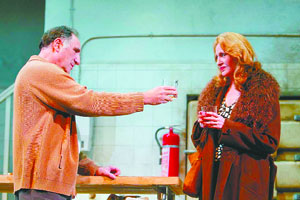Eliam Kraiem looks at Israeli-Palestinian tensions brought home
The two central characters of Eliam Kraiem’s “Sixteen Wounded” are Hans (Judd Hirsch) a Jewish Holocaust survivor, and Mahmude, (Omar Metwally), a Palestinian freedom fighter. The play is set in a bakery in Amsterdam between 1992-94.
Francis O’Connor’s minutely and beautifully realized bakery is divided into the kitchen/workroom occupying half of the stage and a Beaux Arts storefront with a bakery vitrine and cafe tables, the other. There are stairs in the kitchen leading to a second floor.
The play begins as the middle-aged Hans and Sonya (Jan Maxwell) descend from his apartment having just made love. It’s the ninth anniversary of his hiring her as his weekly lover and he implores her to stay for a drink. She demurs, “We have a good arrangement. Don’t ruin it.”
He’s not so sure. She reminds him of what he paid her when they started nine years ago and says, ”Imagine what a fine arrangement it would be if you still only paid 15.”
He says, “Arrangement. It is an ugly word.”
She: “Every romance is some kind of arrangement.”
He: “So this is a romance?”
She thanks him for the drink and the evening and leaves.
Maxwell as Sonya is beautiful. We know Hans is in love and we’re hooked on them.
Hans watches the ball game on TV. There’s a huge crash of breaking glass. Mahmude arrives smashing through the bakery’s offstage plate glass window and he lands with a thud, some blood, and a lot of broken glass. Two and a half hours later, we leave the theater feeling we’ve gone through the window.
Mahmude had been chased by Jewish thugs and dove into the bakery to escape them. Hans tends to his wounds and inveigles him to stay as his assistant. This seems absurd but a scant twelve scenes later we find out why. It’s too little too late. Mahmude and the bakery sales woman Nora (Martha Plimpton) fall in love. Plimpton is too charming to believe she’d see much in Mahmude.
The fact that we’re in 1992-94 is only mentioned in the playbill. These were the years in which the nearest thing to a peace resolution between Israel and the Palestinians was achieved. In 1993, with a Democrat in the White House and Yitzhak Rabin the left-leaning Labour Party prime minister, Israel and the Palestinians, represented by Yasser Arafat, agreed to a declaration of principals on interim self-government, brokered in Oslo, Norway and signed in Washington. Pres. Bill Clinton pressed hard to bring about the agreement.
By setting his play in those years, Kraiem is positing Hans and Mahmude’s friendship as symbolic of Rabin’s and Arafat’s handshake toward peace.
The Oslo Accords are mentioned once in the play with Hans predictably saying, “It’s a start” and Mahmude declaring Rabin “a terrorist.” The bulk of the play feels just like the Palestinian /Israeli conflict, an endless impossible argument. If you’re unfamiliar with the Palestinian point of view, you may learn something here. Otherwise, you’re left with a play where the central conflict is the Palestinian /Israeli war, and a play where the central conflicts on stage are: Will Mahmude stay or go? Will he commit atrocities? Will Nora and he stay together? Will Hans and Sonya make a go of it? Can Hans, by renouncing his faith, prevent Mahmude from killing again?
These questions sound like high stakes but we’re never really engaged by Mahmude, and, whatever happens, Hans only has Sonya to lose. Kraiem concocts a story which is meant to hold our attention through Hans’ investment in making amends as penance for past sins, but it doesn’t really wash. Judd Hirsch and Jan Maxwell as lovers are the only dyad able to achieve enough emotional credibility to gain our credulity. They are consummate actors and they have the best scenes, the only ones that are entirely character-driven. Their relationship is almost worth the pedantry of the rest of the play.
But Garry Hines has directed the play with panache. All the titters to be had, the audience gave.
All of what we see on stage in “Sixteen Wounded” takes place in the morning before the bakery opens and after it closes at night. Three loaves of bread leave the oven. No passerby is to be seen out the store window on the street. Time is not easy to tell. It’s morning, it’s night. Now they’re in love. Now this, now that. There are 13 scenes, each of which is separated by a seemingly merciful blackout.
Unfortunately, these potential respites are marred by John Gromada’s music that, with its clunky references to Russian and Arabic folk music, is reminiscent of junior high school documentaries on, say “The Essential Camel in Saharan Survival” or “The Story of Wheat Production in the Ukraine.”
For all that, this is an ambitious play for a young playwright, and it’s encouraging to see serious political ideas on Broadway.
We also publish:
Advertising


































